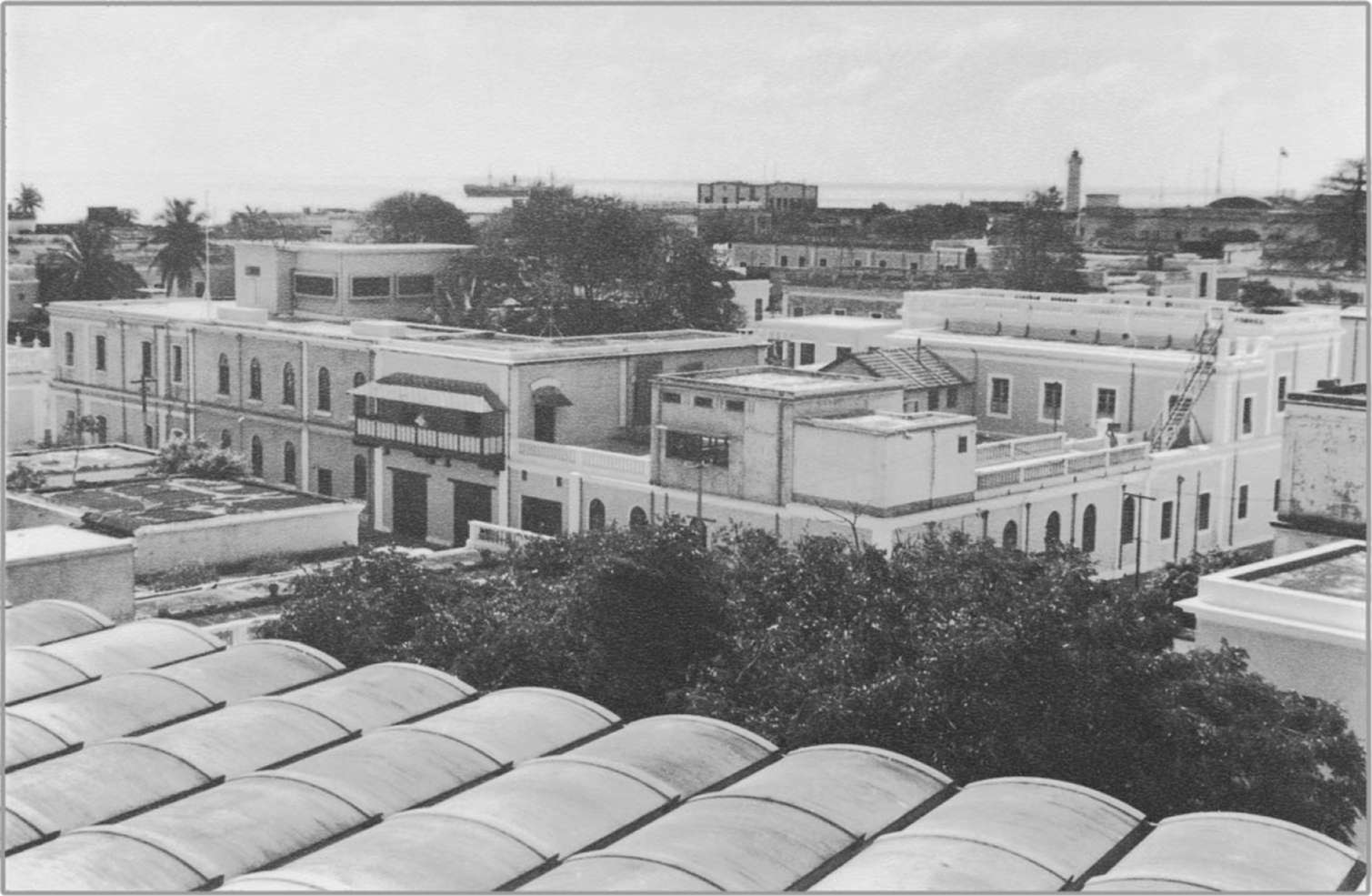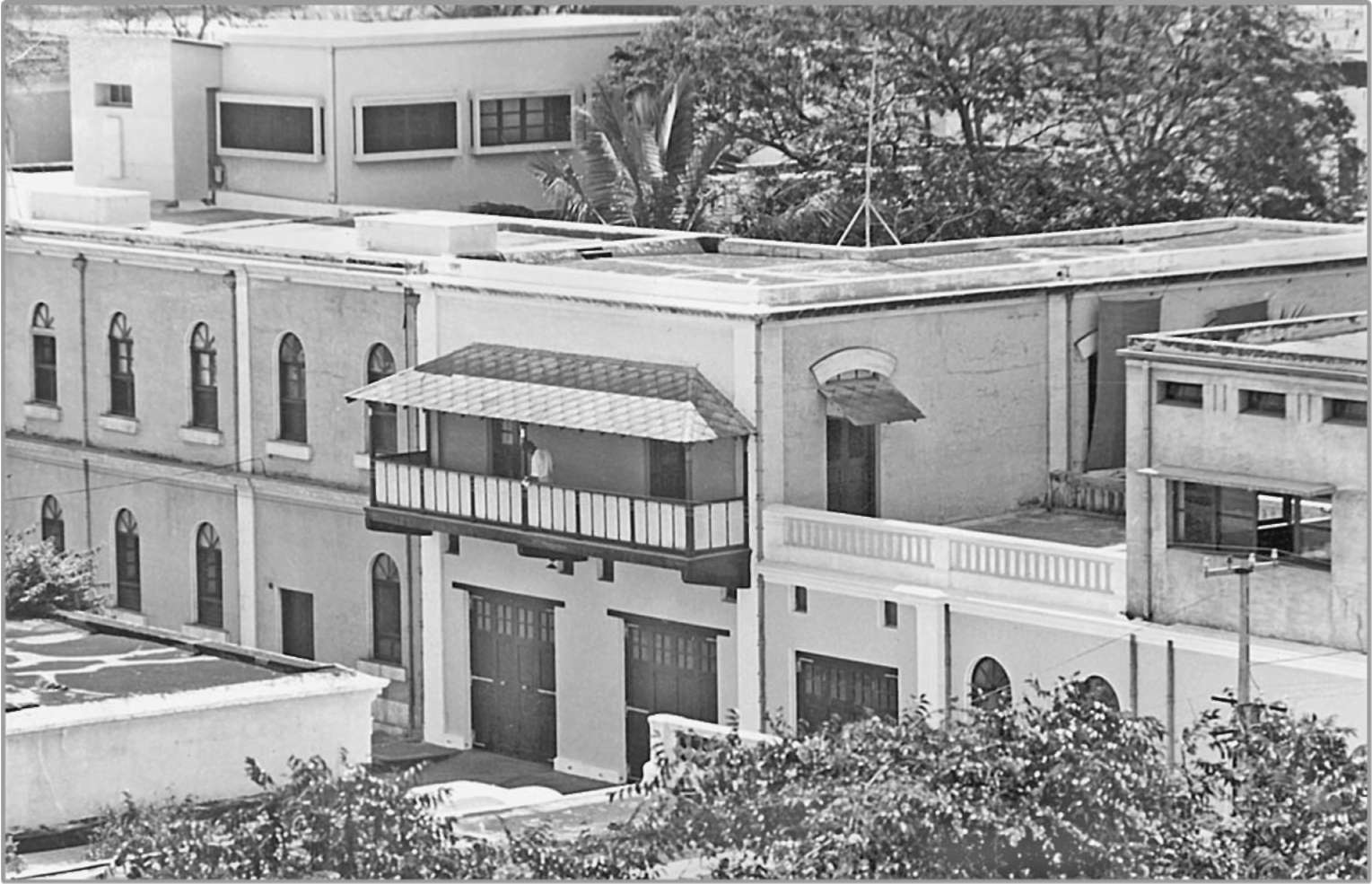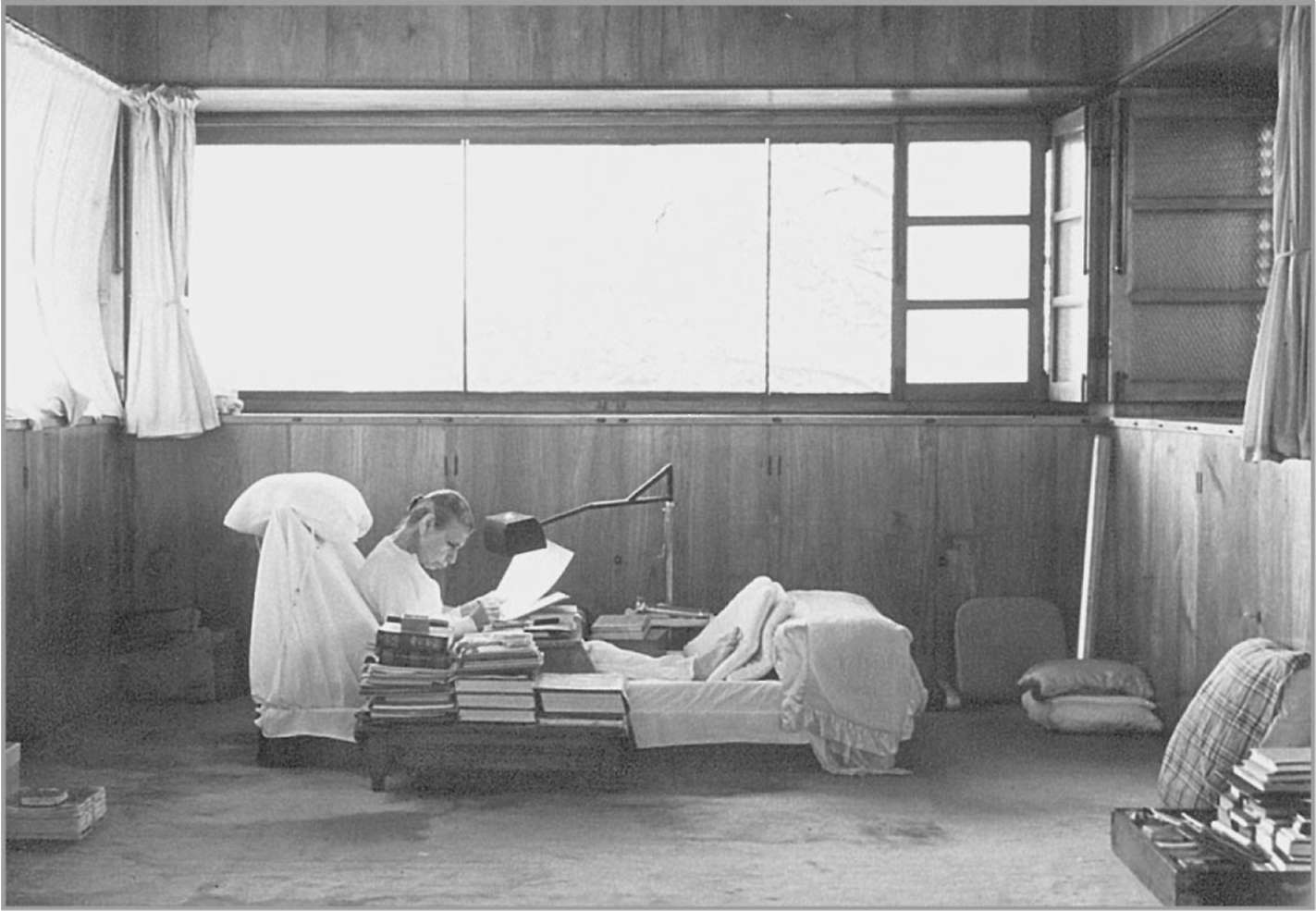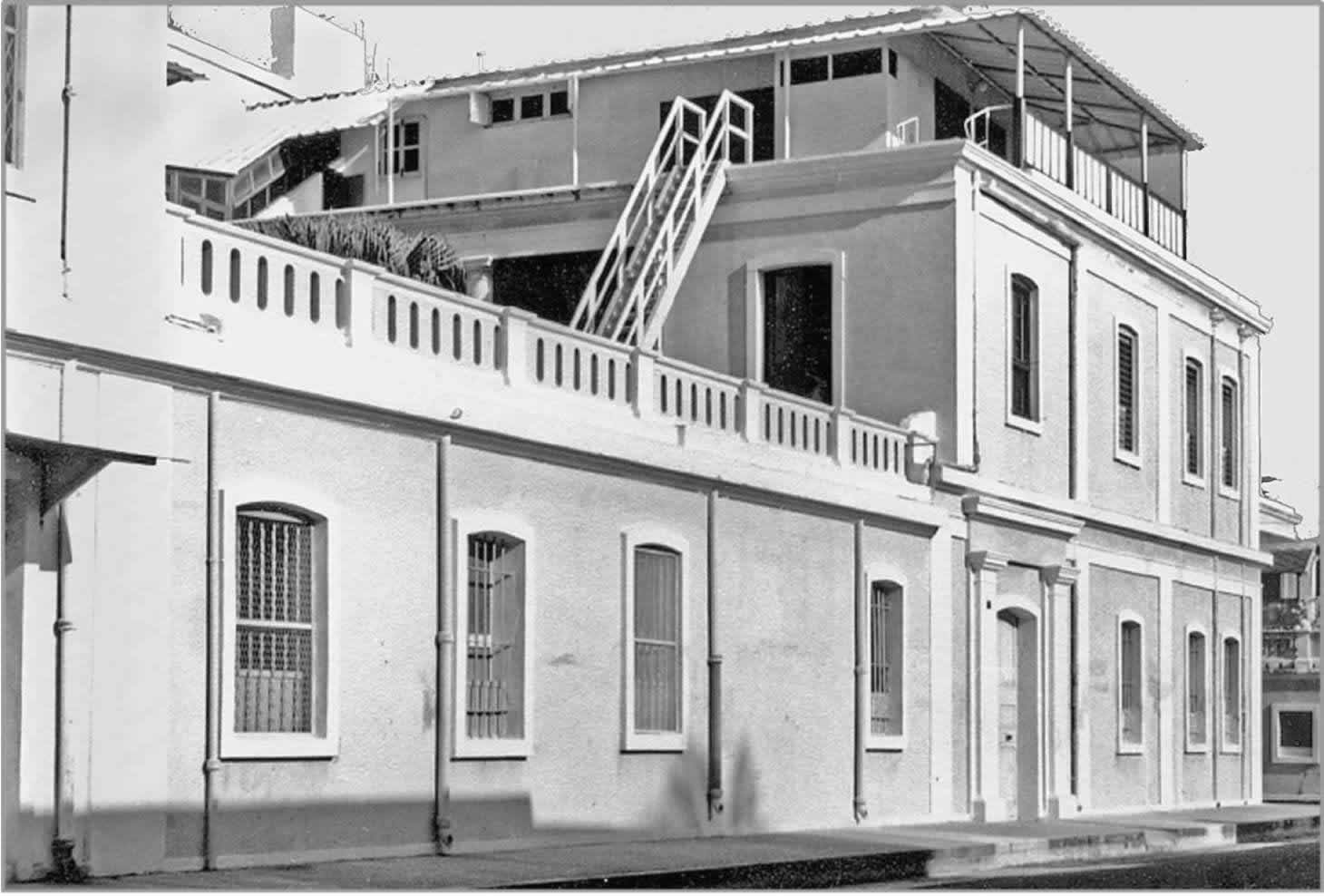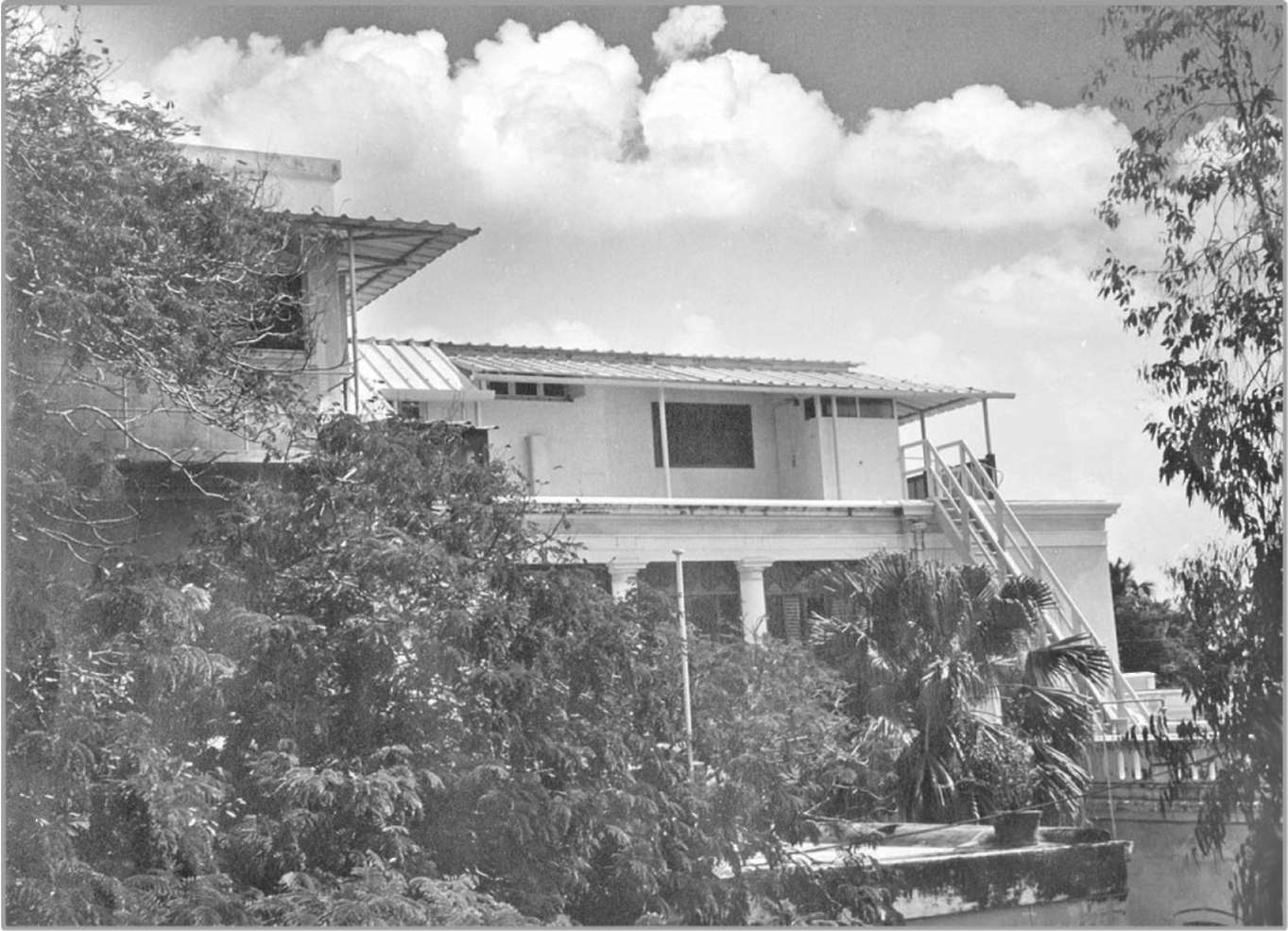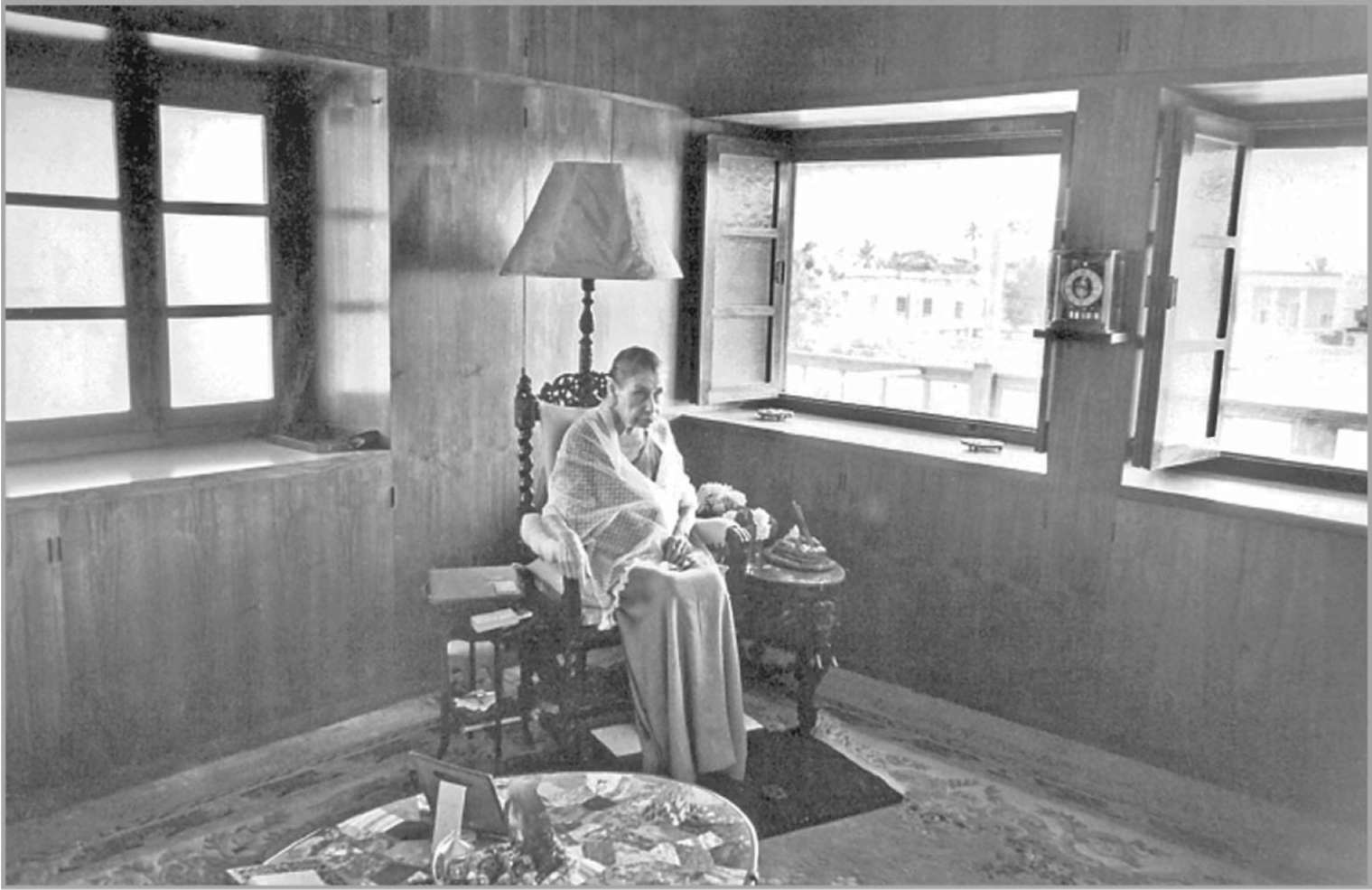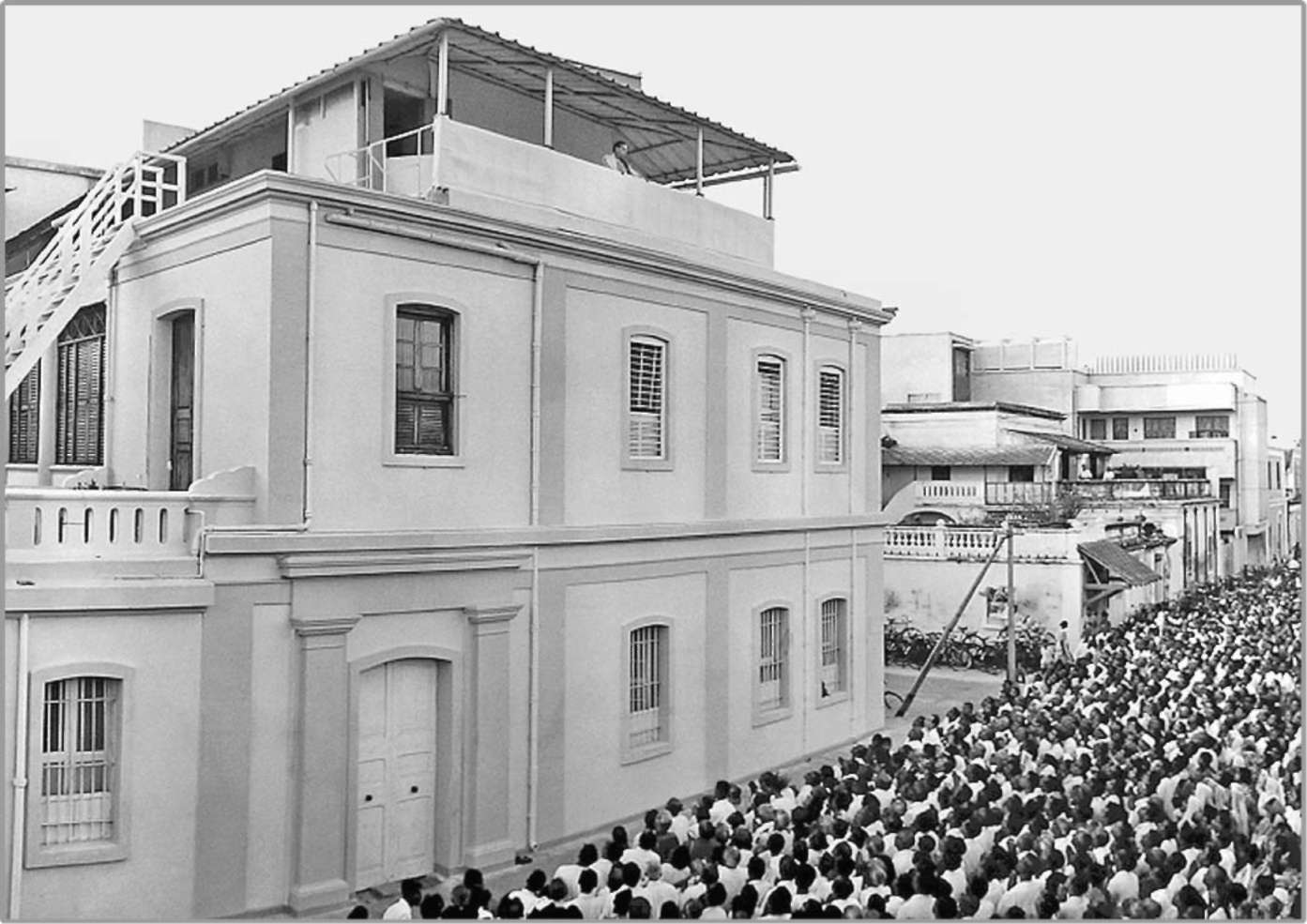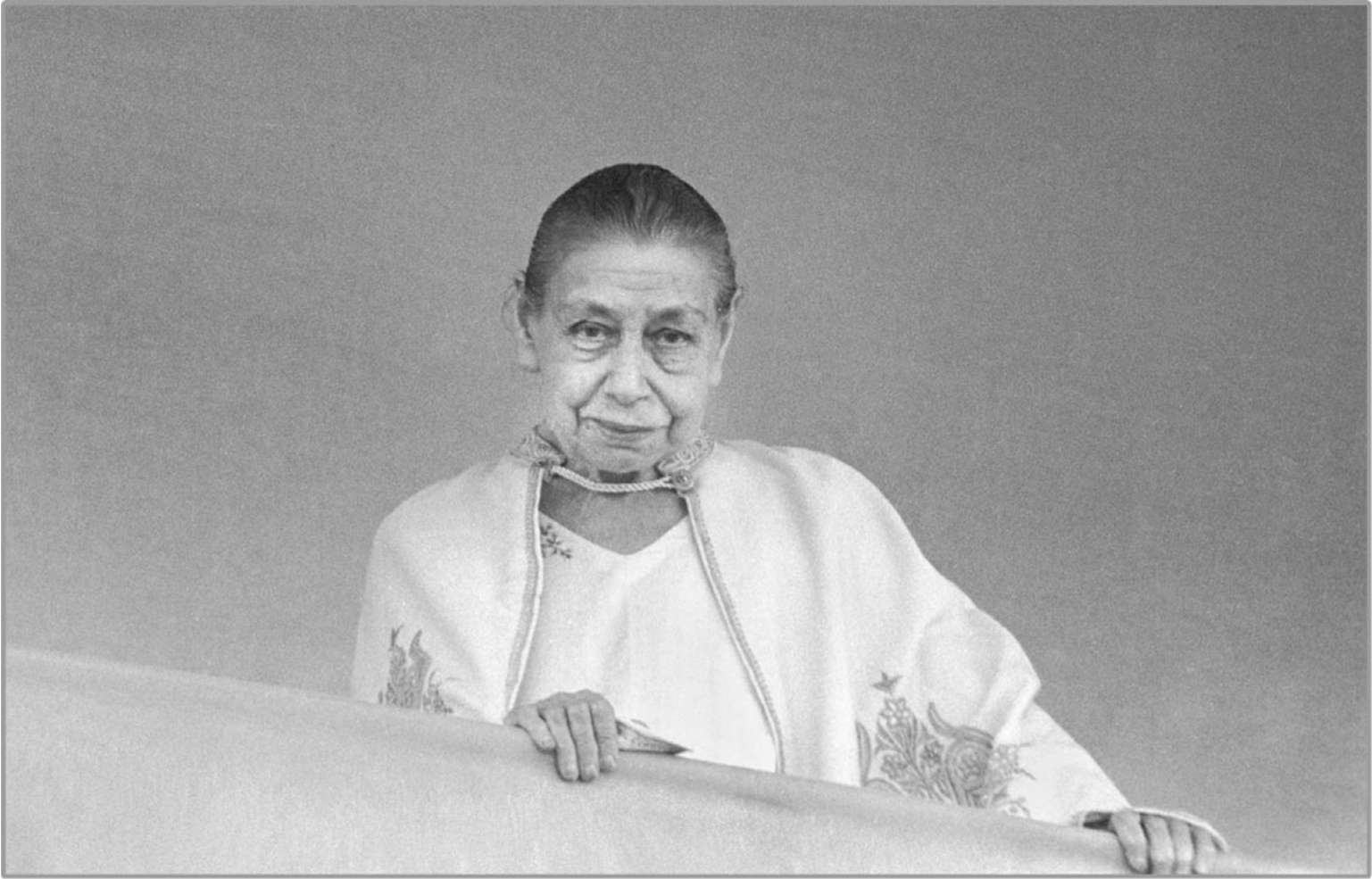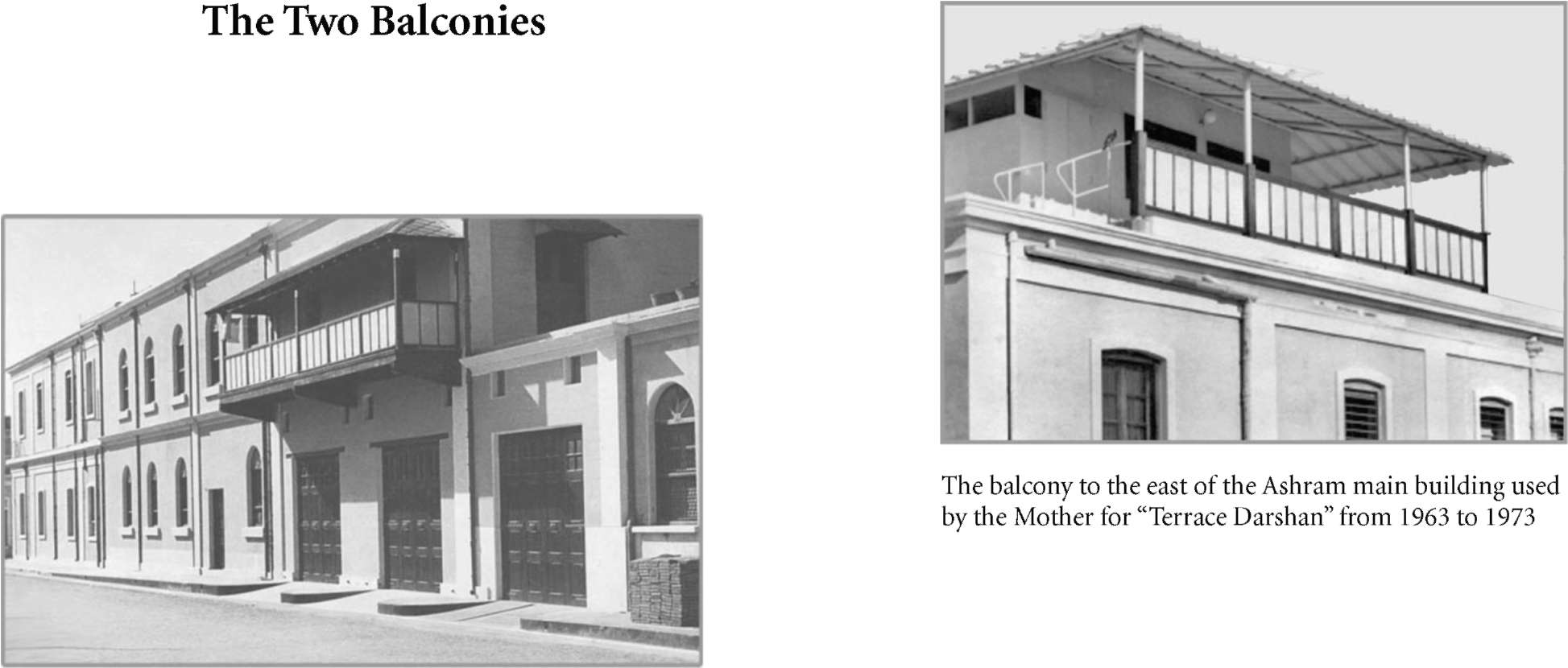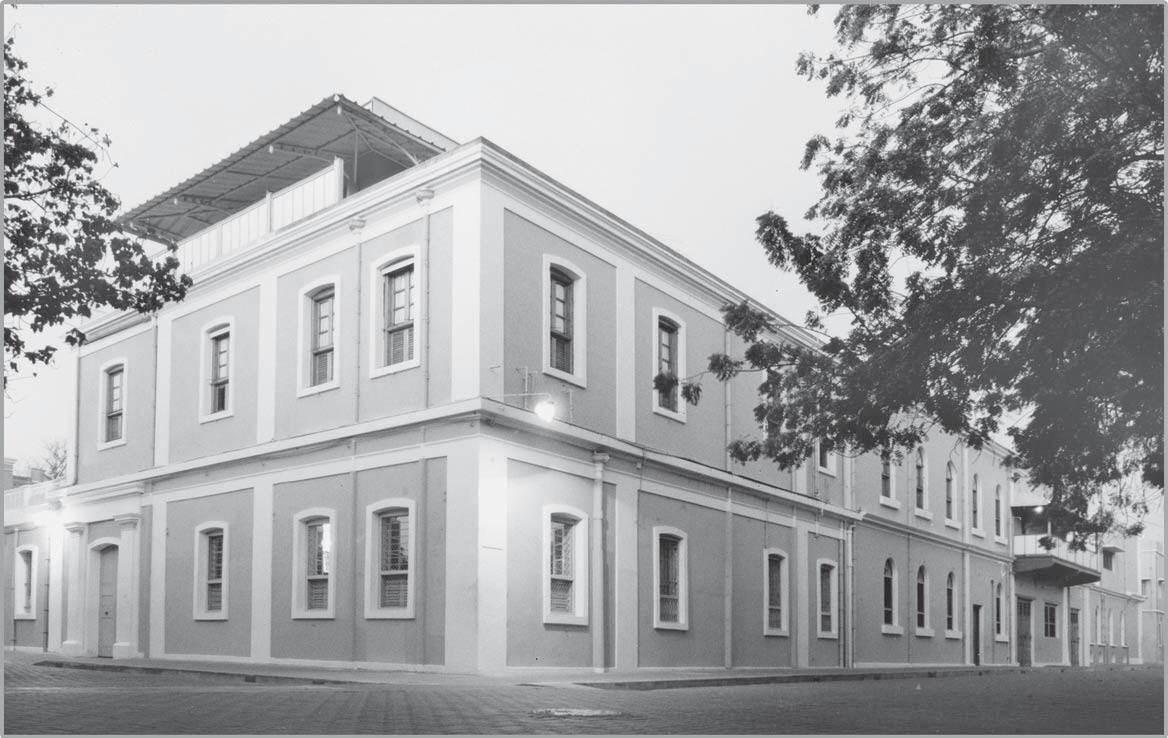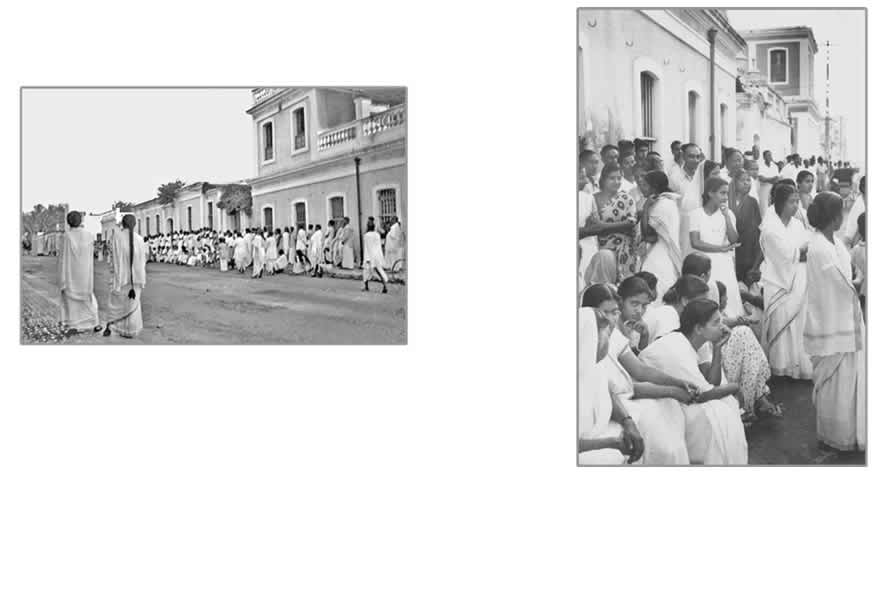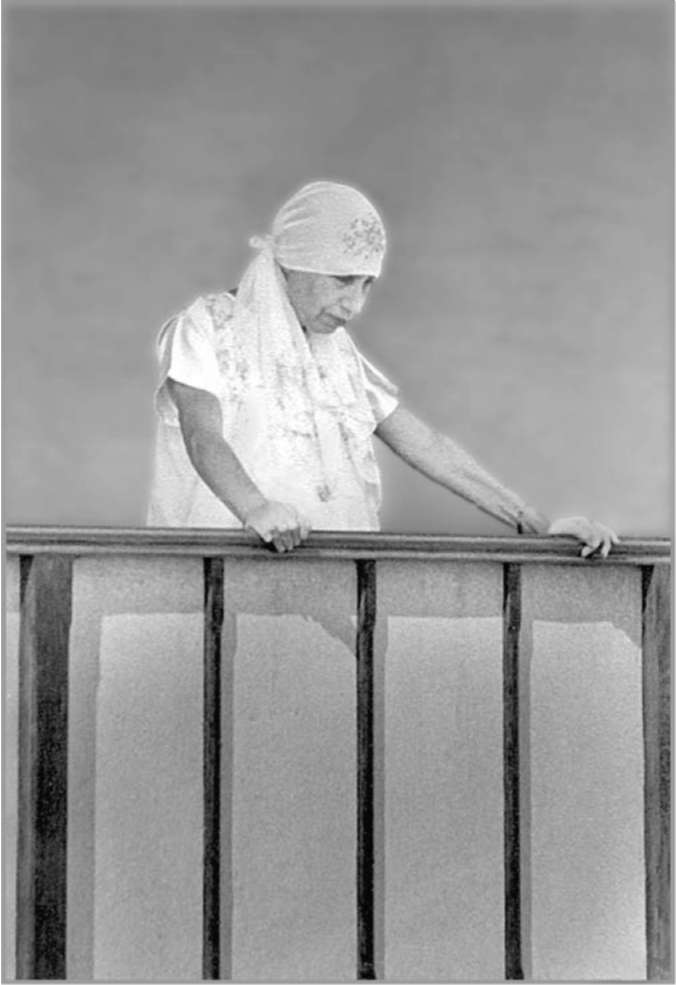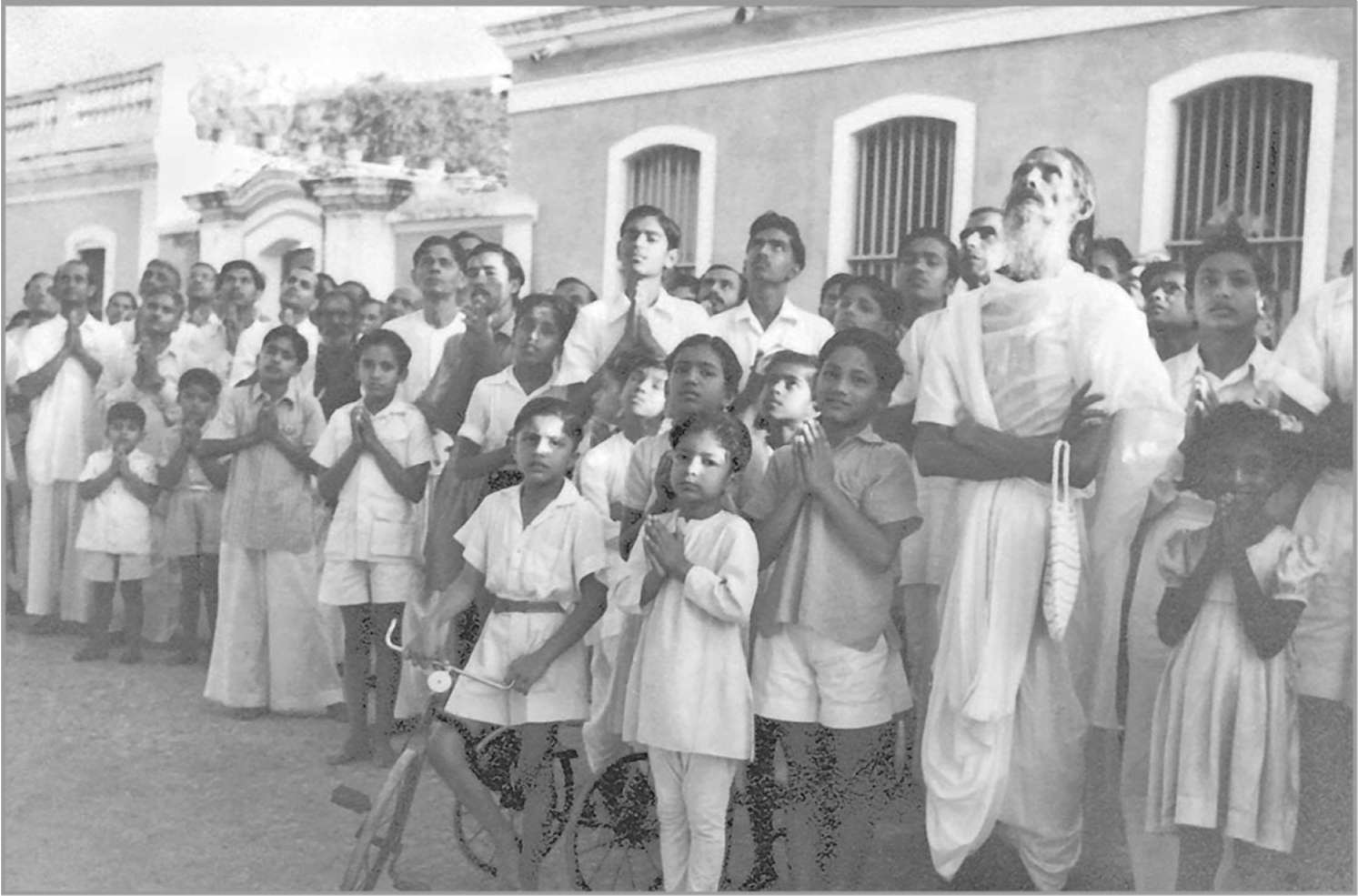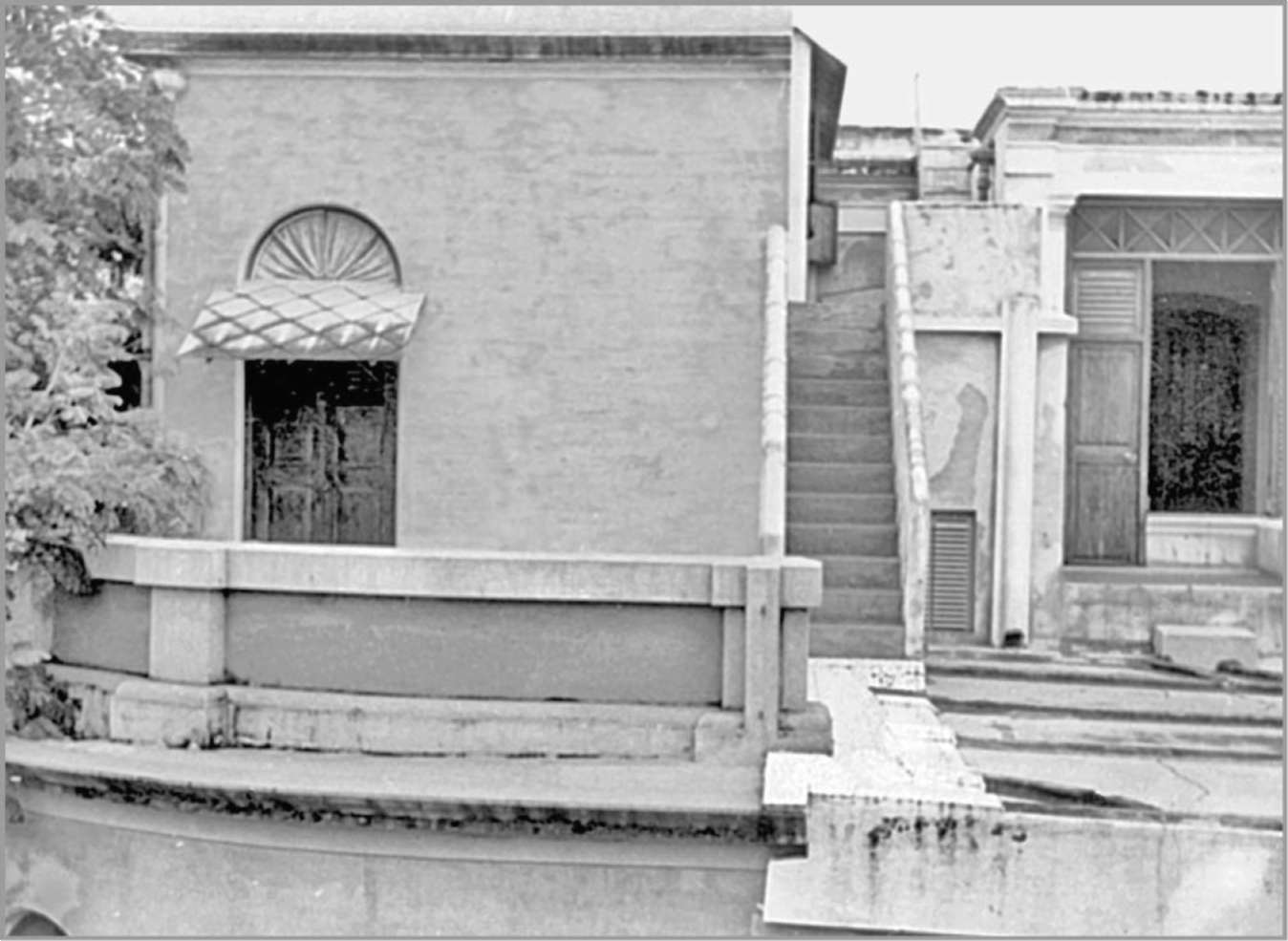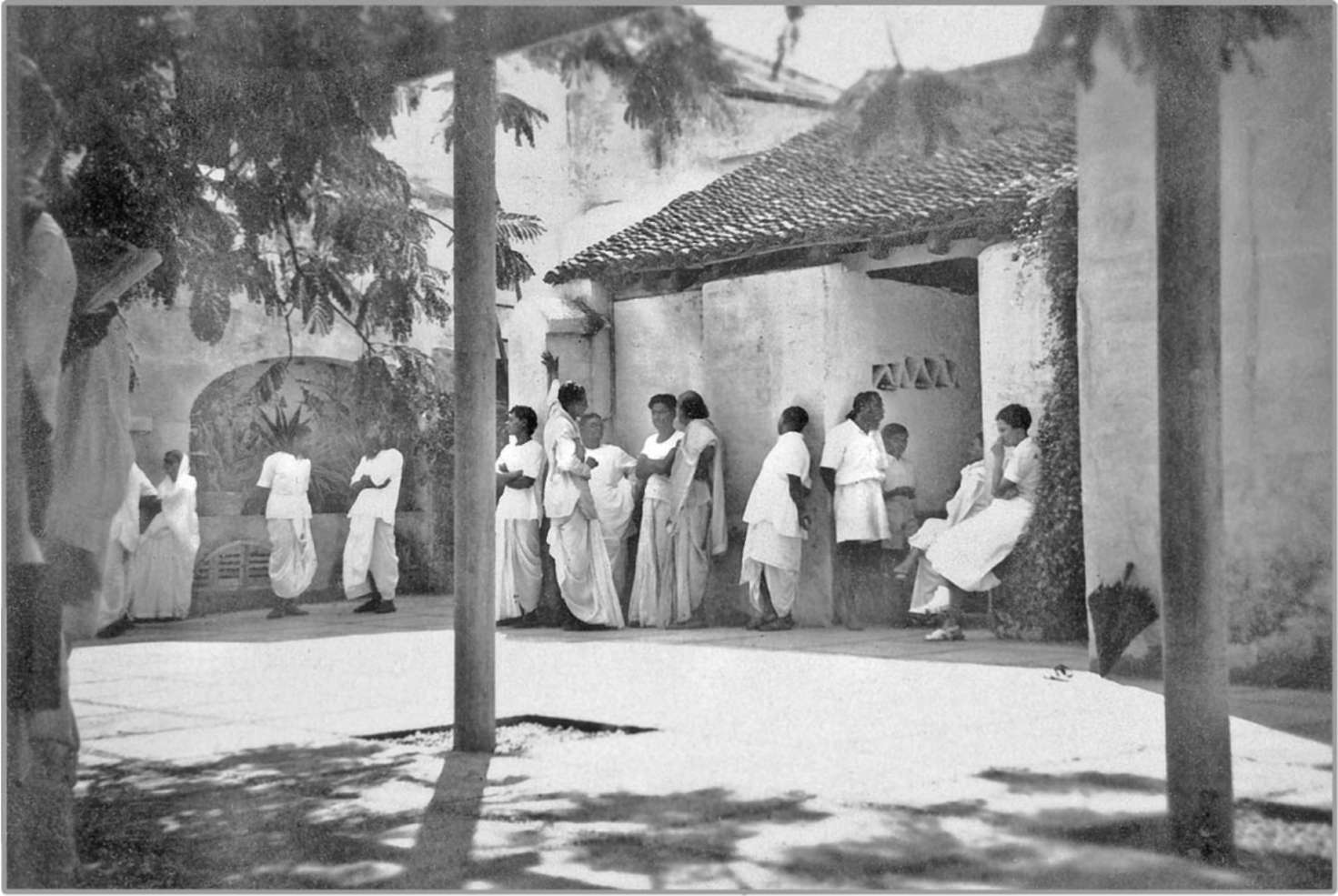The Mother's Rooms on the Second Floor
The Mother's Room
The Mother did not have a room of her own [until 1953]. She used to rest in a hall [the Salon] adjoining Sri Aurobindo's rooms. But it was a sort of public hall. People were constantly coming in and going out, so the Mother was never left in peace. But being the Divine Mother, she never uttered a word against it. She was accustomed to putting up with all kinds of discomfort, disturbance and inconvenience. But this caused great pain to Dyuman. He began thinking of how to have a separate room for the Mother.
One day she felt indisposed and returned from the Playground before nightfall. She called Dyuman and said, "Get me a pillow. I want to lie down flat."
Dyuman rushed to bring a pillow and gave it to her. The Mother put off the lights and rested for half an hour. Dyuman became pensive. He mused, "The Mother does not have a private room where she can rest undisturbed during the day. The coming and going of people stops late at night and only then can she rest for some time." He found this situation unbearable. He told the Mother, "Mother, where will you rest if you fall ill during the daytime? Where can you lie down? This is a sort of a common room. Should you not have a private room?"
The Mother agreed with him, but added immediately, "Dyuman, you may construct a room for me, but see that you do not spend any Ashram money for it."
Dyuman accepted the Mother's condition. He wrote to his close friend Navajata in Bombay to send a lakh of rupees for the construction of the Mother's room. What was it that Navajata would not do for the Mother? He immediately sent the money and Dyuman built a room for the Mother.
Ranadhir Upadhayay 30
Page-120
The Mother moves to the second floor
|
It was also during 1953 that a disciple offered to construct a new room for the Mother above the first floor of the Meditation House. Soli Albless, another disciple, was one of the architects entrusted with the task of designing and building the room overlooking Sri Aurobindo's Samadhi. The spacious room was completed and properly furnished by the first week of December and was ready for occupation. Srinivas Iyengar 31 What is known as the Mother's room is the room which is opened for Darshan on her birthday (21st February) and the day of her passing away (17th November). It was built by Soli Albless in 1953 and it should not be confused with the Music Room (also known as her Reception Room) built by Udar Pinto in 1962. Both are on the second floor of the Meditation House; the former is on the west overlooking the Samadhi while the latter is adjacent to the balcony on the east. It should be noted that the Mother also stayed in other rooms of the Ashram main building at different times, though these are not known as such. See pages 160-61, 170-73. Editor's Note |
On the morning of the 9th December, 1953, after meditation, Mother informed Dyuman that she would go up to her new room on the second floor from that night. Thereafter she spent the nights there. And now and then she would spend some time there during the daytime also. Champaklal 32 |
Page-121
|
|
Page-122
|
|
Page-123
|
|
Page-124
|
|
Page-125
Redesigning the Mother's Room
Were you involved in the construction of Mother's Room on the west?
No, because at that time [1953], I was not in charge of the Drawing Office, I was in the Electric Service. But during the construction, Udar and I, we both did the vibration of the concrete.
Who designed it?
Soli Albless designed it. Umirchand executed it and I was doing a little supervision here and there. And in Albless' design, the windows were jutting out and Mother had no end of problems with the rains getting in. So we had to put a verandah all around to protect the windows from the rains. The verandah was added later on [in 1958]. We had put in concrete cantilever beams for the verandah into the wall below, and then we could cast the verandah and, over that, the asbestos roof was provided.
An Interview with Vishwanath Lahiri 33
Page-126
|
|
Page-127
|
The Music Room and the East Balcony Mother had been presented with a wonderful Wurlitzer Electric Organ on which She would play regularly. It was kept in Pavitra's room. This also She could not use now. Then one day I said to Her that unless She played on the organ from time to time it would get spoiled, and none of us would like to play on Her organ. So Mother asked me what was to be done and I suggested that we bring the organ up to Her new room [the room overlooking the Samadhi]. She refused to agree to this as She said that there was no space for the instrument in Her room: it would upset the balance of the furnishing of the room. So then I suggested that we build a special room next to Her bathroom as there was enough place on the terrace for it. Mother agreed to have a small room specially for the organ, and we set about to design it. Now my Aunt Mary had given to Mother a beautiful carpet, an Aubusson, which she had herself received from the Maharaja of Mysore. Mother liked the carpet very much but did not know where She could use it. So we decided to put it into the Music Room that we were designing. We then did a strange thing: we designed the size of the room to fit the carpet instead of getting, as is usual, a carpet to fit a room. This made the room quite large and then there was still some space left between the end of the room and the eastern extremity of the building. That space, we felt, could well be used for a covered balcony which could be carried round to the south side also. This change we kept rather secret and did not even inform Mother about it. It also meant quite a bit more expense. So Dyuman, who had to find the money for all the work, was annoyed at this additional expenditure which had not been sanctioned by Mother, and he expressed himself quite strongly. |
When all had been built I informed Mother that everything was ready for Her to see, and She came to see. She liked very much the large Music Room in which we had already installed the organ. Then She looked out east and saw the balcony and She said: "Udar! What is this you have done? A balcony! Do you expect me to start giving Darshans again from here?" I replied: "Mother, I expect nothing but only that You are happy with what we have done. So please come out and see this balcony." And Mother came out. In the meanwhile, we had sent word around that Mother might come on the new balcony, and so there were people all about, on the street and on each surrounding terrace, etc. Almost the whole Ashram had turned out and they all had a Darshan of Mother, after such a long time. Mother gave a real Darshan, standing some time looking at all as She did whenever She gave Darshans. All were so happy and Dyuman came to me and embraced me warmly and said: "Udar, forget all I said before. Our people have had Mother's Darshan at last. This is worth all that has been spent and even more; I am very, very happy." This brought tears to my eyes because I am very fond of Dyuman and was not happy that he had been angry with us. Now it was all wonderful. This, then, is how the new balcony came to be and Mother gave Her Darshans on every Darshan Day from there. The Music Room was also very useful to Her, not only for Her to play the Organ but also to give Her interviews: She could be quiet and undisturbed there. So on every count it was a very happy thing brought about by Mother's Grace and by Her Love. Udar Pinto 34 |
Page-128
|
|
Page-129
|
|
Page-130
|
|
Page-131
Terrace Darshan
|
On her eighty-fifth birthday (21 February 1963), the Mother gave Darshan in the evening at 6.15 from the new "balcony" on the terrace adjoining her apartments on the second floor of the Meditation House, the north-east section of the main Ashram building. A large number of disciples and admirers had gathered in the street below, and they had their long-awaited Darshan of the Mother and her benedictions. For almost thirteen months there had been no Darshan, and hence this was truly an uncommon event. Fair and frail in appearance yet visibly divine, the Mother stood in her simple attire, and surveyed and blessed the mass of humanity looking up to her in love and adoration. There was the union of poise and slow rhythmic movement in her sustained semi-circular sweep of compassionate comprehension, and everyone of the rapt and packed congregation thought the Mother had eyes for him or her alone, and everyone's face lighted with the mystic glow of ineffable fulfilment. Srinivas Iyengar 35 When the Mother fell ill in March 1962, she stopped coming down from the second floor to give the Balcony Darshan. After skipping it on the 17th and 19th, she gave her last Balcony Darshan on the 20th of March 1962. As her room on the second floor (the room overlooking the Samadhi) had only an attached toilet, plans for a new bathroom were immediately drawn and executed. The new bathroom on the second floor was ready on 11 May 1962. The Music Room and the balcony to the east were completed on 15 December 1962. When the Mother came to inaugurate them on the next day, that is, on the 16th, there |
was such a crowd of people on the streets and rooftops wanting to see her that she "had no choice but to go out on the balcony". Though this could be recorded as her first Terrace Darshan, the first official Terrace Darshan was on 21 February 1963. Apart from a few special occasions, the Terrace Darshans were given only on the four Darshan days, that is, 21 February, 24 April, 15 August and 24 November, ending with the last Darshan on 15 August 1973. The two balconies used for Balcony Darshan and Terrace Darshan should not be confused. The Balcony Darshan refers to the Mother's Darshan from the balcony on the north side of the first floor of the Secretariat; the disciples gathered daily on Rue Saint Gilles at about 6.15 a.m. until March 1962. The Terrace Darshan refers to the Darshan from the balcony on the east side of the second floor of the Meditation House. Strictly speaking, this is a terrace enclosure and not a balcony. The disciples gathered on Rue François Martin from 1963 to 1973 and the starting time of the Terrace Darshan varied from 5.15 to 6.15 p.m., depending on the month and the year. There was also a "Terrace Darshan" during the mid-forties when the Mother used to walk at about 10 a.m. on the terrace of the first floor of the Meditation House and the New Secretariat before her rooms on the second floor were built (see pp. 148-153). When this was suspended, the term "Terrace Darshan" became associated with the Darshan the Mother gave from the second floor balcony to the east from 1963 to 1973. Editor's Note |
Page-132
|
|
Page-133
|
|
Page-134
|
|
Page-135
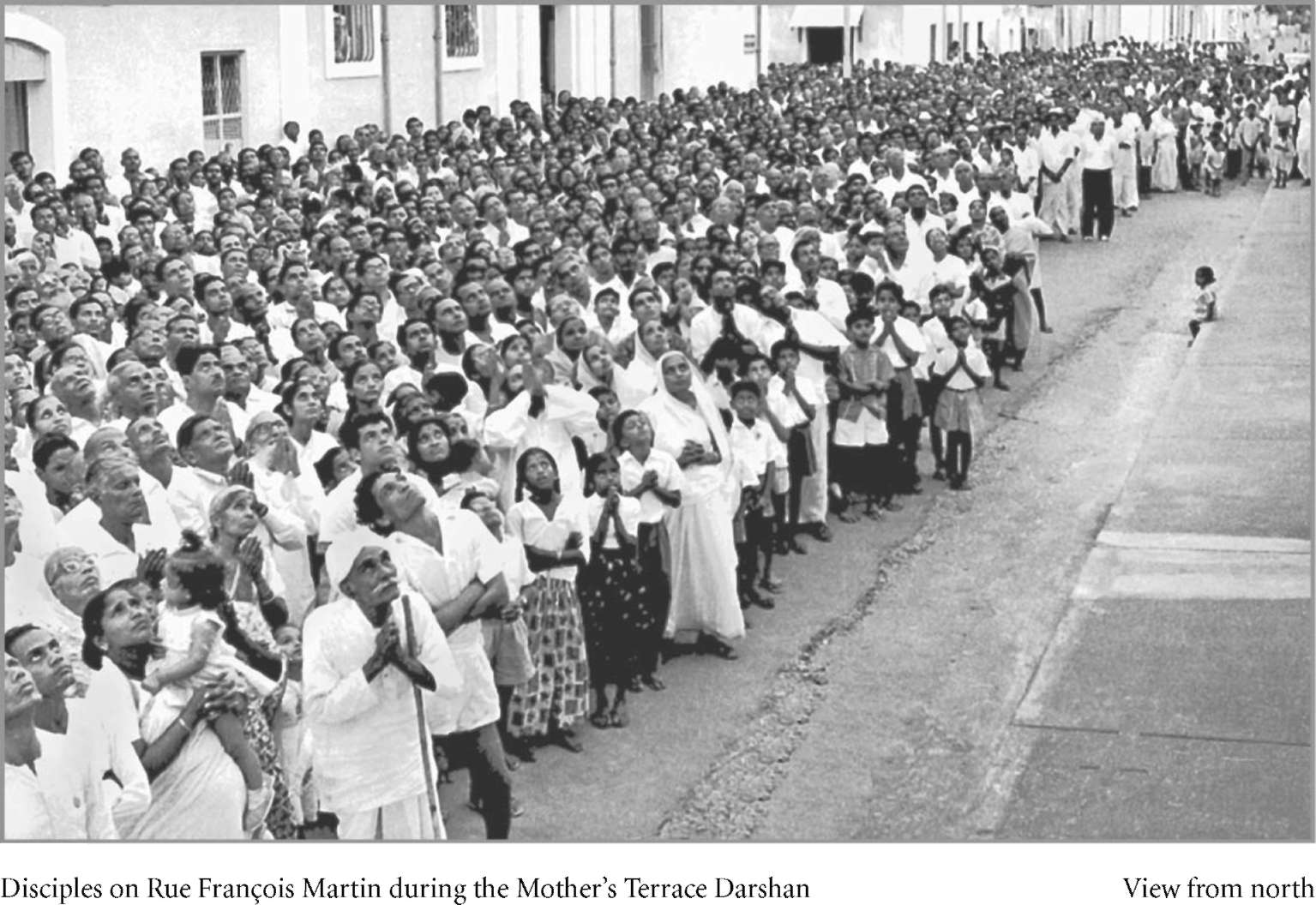
Page-136
|
|
Page-137
|
|
Page-138
|
|
Page-139
Balcony Darshan
|
Often you have asked me to write to you about the most striking things of the Ashram here and so long I have somehow dodged the issue. You see, it isn't at all an easy job to pick and choose the striking things of the place. I am still, like a novice, seeing things more than understanding their deeper import. However, just to satisfy your curiosity, I am giving below some idea of what's known as the Balcony Darshan here. In my view it is the most marvellous part of the daily routine followed here and I have attended it almost every day of my stay here. Yet who can conspire with words to arrest and confine the peculiar thrill of the union of the human soul with the Divine? It is no ordinary darshan we see before us. There is no proclamation, no ceremony, no obsequious bowing or supercilious admittance. Here is no hurry, no bustle, no pushing nor jostling. Here there is no newspaper trumpeting of numbers, nor pompous festoonings and loud greetings.
|
poets and sportsmen are moving to the one gravitational point of the balcony of grace. They are like muted waves driven to the shore by a simple, sweeping breath of some invisible power. Nothing, it seems, can resist this centripetal movement. Whether one comes alone or in twos and threes, the driving force is one undivided Presence. Within a few minutes, the whole scene of multitudinous gathering gets set before us. Small children have selected a little spot of their own. Free and frolicking as they are, they must have their little chat and fun even here and at this hour. The Mother keeps them in her breast forever and need they suspend their little talk and play for the sake of what we call conscious aspiration? And yet here even these child-souls never for a moment forget the purpose for which they have come, the glimpse of the loving mother they will have. But some of the grown-ups among them are already quietly standing or sitting apart, trying to awaken the proper spirit of welcome in their bosom and thought. Some of the adults quietly talk shop for a while; they almost automatically adjust themselves to the divine hour. But most are wholly engaged in silently sending prayers from the places they have chosen themselves. Each has his or her own favourite spot and as soon as they are on it, their inner being, it seems, gets in touch with the Divine Mother as though some unerring Finger has tuned them at once to a spell-binding mood of celestial waiting.
|
Page-140
|
created such a superhuman atmosphere of calm expectation that the scene appears to be ideally set for the purifying advent of the golden Dawn.
|
radiance of the divine beauty. The breeze plays a celestial music. The soul blossoms with a rapturous fragrance. Wearing a smiling gravity all through, the multiform, multi-dimensional aspects and powers of truth converge upon a single leaning, down-looking expression of the Mother. The earth is gathered up into the heavenly vision. Truth alone rules and triumphs.... Shreekrishna Prasad 36 |
Page-141
|
|
||||||||
Page-142
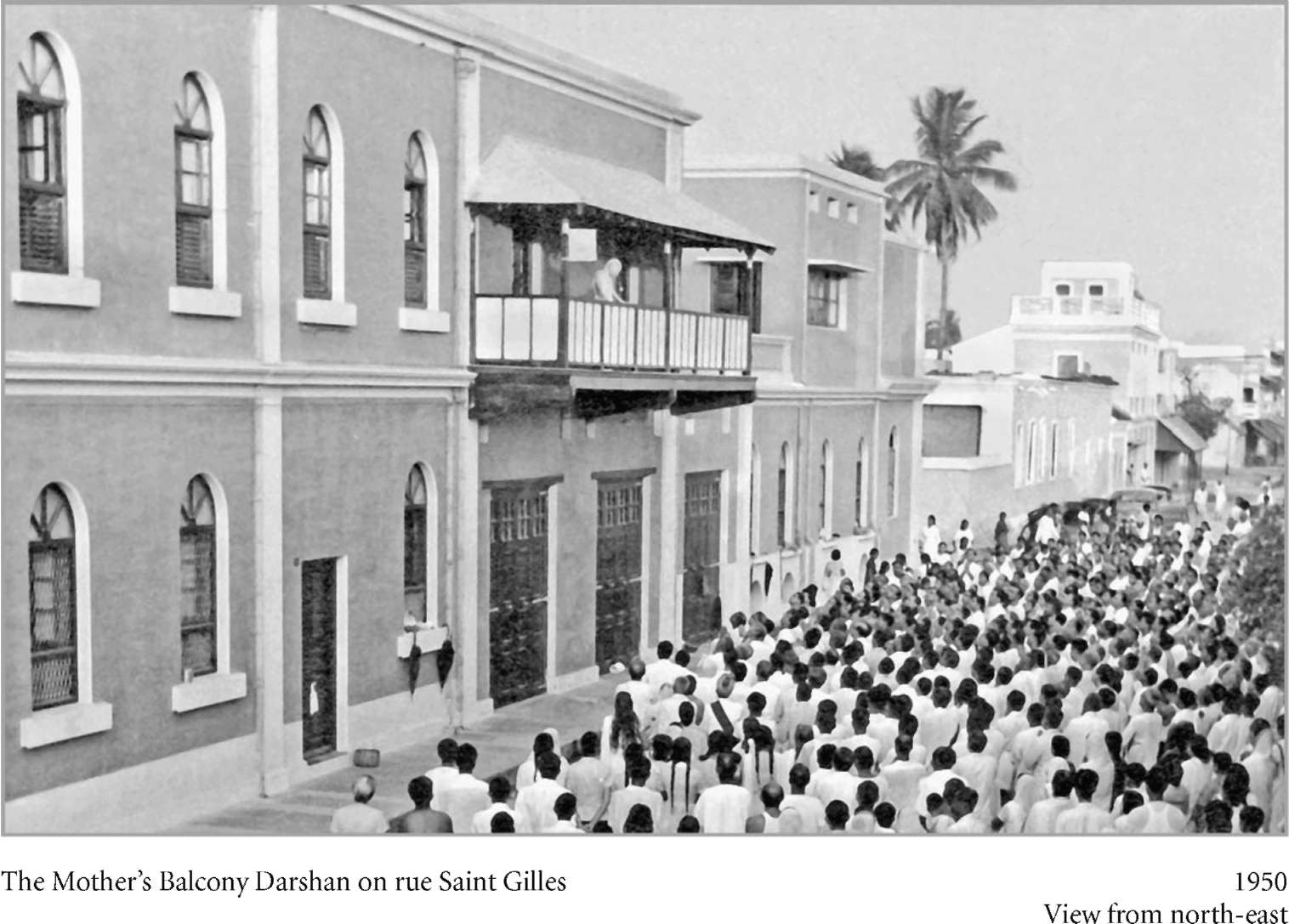
Page-143
|
|
Page-144
|
|
Page-145

Page-146
|
|
Page-147
The Mother's Terrace Walk
After giving a biscuit to the crow, Mother went like this and stood
here [see Point 1 in drawing] and we had her darshan. We were very
young, we tried to go to the top of the staircase there [Kamalaben's
staircase]. You might know Jwalanti and Nishtha, they sat with us.
Was this immediately after the Window Darshan?
After some time, within half an hour, by ten o'clock.1 She would
feed the crow and come and stand here [Point 1]. She saw everybody,
and then she would go up by this staircase.2 She went to the top
where is now her room, that is, the top landing of the second floor.
She stood there [Point 2], and from there, looked again this side
[south]. We all used to be here [in the courtyard south of Madhav
Pandit's office]. Then from there, she walked straight to Pavitra's
terrace. On that terrace, she came right up to the edge [Point 3].
She stood there in the middle, just above the door of Pavitra-da's
room. From here [courtyard south of Dyuman's room], we ran there [to
the courtyard south of Pavitra's room]. The Service tree was quite
small and compact then. By that time, Mother would come to the top
of the Salon [Point 4]. Mother's room on the second floor was not
yet there. It was built later, in 1953. She used to come right up to
the edge [of the terrace of the Salon]. She stood there with
Chinmayi holding the umbrella over her. And then, again, she walked
down the length of the room to come to the landing there [Point 2].
She would again look around, and start coming down. Come down; come
there again [Point 1]. And go in [the Salon].
An Interview with a Sadhika 37
1. The timing seems to have varied during
different periods. Rakhal Bose reports the same Terrace Walk (Darshan)
of the Mother at "about 11 a.m." in 1944. Similarly, there are
varying reports of the route followed by the Mother during her
Terrace Walk.
2. The staircase, at that time, didn't start from the south of the
Salon, but from the terrace of Madhav Pandit's office.
Page-148

Page-149
|
|
Page-150
|
|
Page-151

Page-152

Page-153

